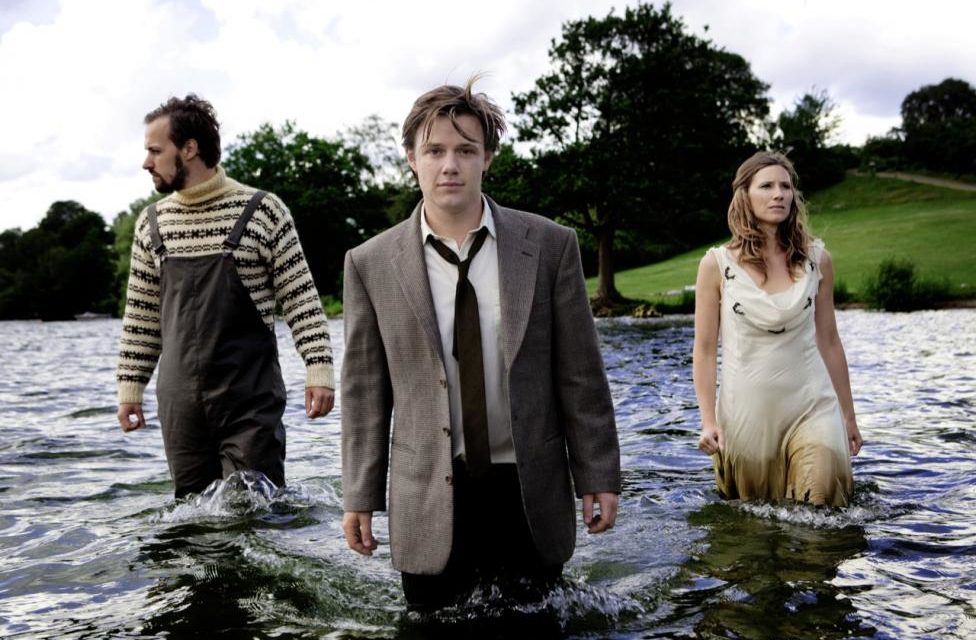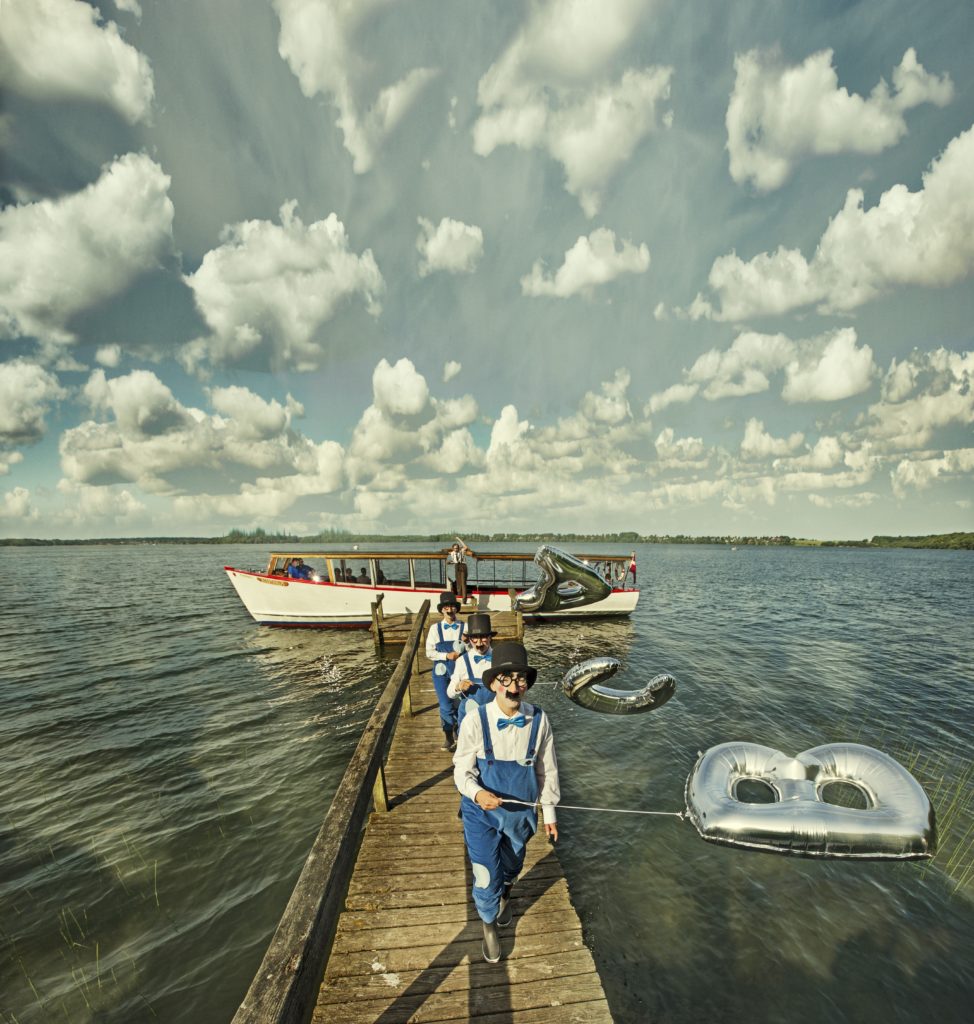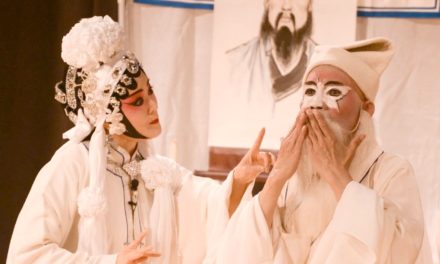Actor and artistic director of the Danish theatre company Det Flydende Teater (literally “The Floating Theatre”), Pelle Nordhøj Kann writes about managing and creating theatre in the outdoors. Reality always wins.
Approximately 50 audience members are waiting in the gentle summer rain by the landing space.
I am hiding behind a shrub, wearing a padded suit and a bowler and sporting a fake pipe.
For a brief second, I think: “What on earth are you doing–was this what you dreamt about those ten years ago when you founded Det Flydende Teater?”
The rain has made my excessive stage makeup drip, and it is getting into my eyes. It hurts. The stage manager indicates that it is time to start the performance, and I think: “GREAT!–Today Storm P will start the show sobbing.”
The second that I, together with my three amazing colleagues, step aboard the old wooden boat, greet the same old skippers, who have been sailing the boat since 2007, and see the looks of expectation from the audience–many of whom I recognise from last year–and their friendly smiles, all doubt is removed: “YES!! This is what I dreamt of.”
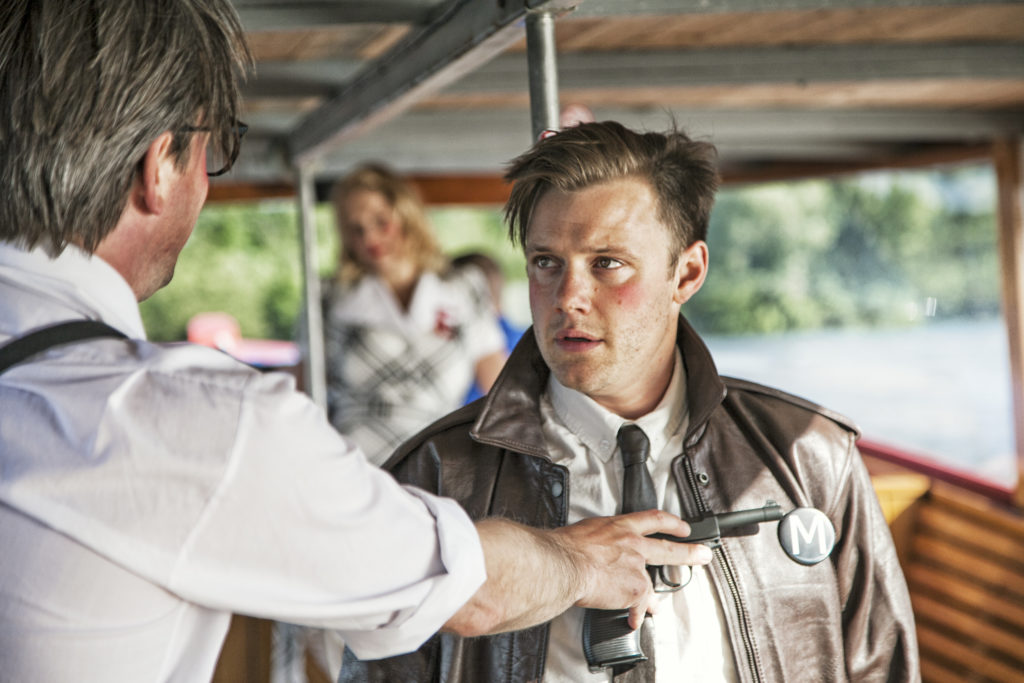
Photo: Per Morten Abrahamsen
The concept of writers
The path to here has been anything but straight as an arrow. My former colleague Hanna Liv Møller and I inherited in 2006 a theatre concept from the theatre formerly known as Teater PræCdens, which for several years had produced theatre performances on the Fure Lake known as Furesøen, north of Copenhagen, on boats belonging to the company Baadfarten.
Hanna and I wanted to further develop the concept, and the formula as such was very clear:
We focus on an author who was or is closely linked to the area, write a performance of approximately an hour about him or her, and use and include that person’s own works, diaries, auto biographies, etc., to transform all this into musical theatre.
Which we then perform in the most idyllic surroundings ever imagined. As with so many other newly established theatre companies, our financial situation was challenging in the first many years, and we basically only survived because of our colleagues’ merciful generosity.
Evening after evening, talented colleagues sailed with us on the lake in all sorts of weather, and I have no doubt that the main reason Det Flydende Teater still exists today is that we have been fortunate to attract a really competent labor force in every department. It is certainly not the wages that attract our staff.
But I like to think that it is the particular vocational challenge and satisfaction, which can be tied to performing in the outdoors, that many find appealing.
Reality always wins
Baadfarten’s old, wooden boats can seat approximately 50 audience members, and everyone sits in the front row, surrounded by the actors and musicians. No one can hide in soft, cushioned seats in the dark and take a nap–at least not undetected–and as we have ventured into nature, subsequently something particular happens to all of us.
The weather is changeable. The sun beaming down and blinding the actors. The wind whistling as a full-fledged orchestra. The rain beating mercilessly against the boat’s edges and prodding our latent fear of drowning. The waves quietly and poetically lapping against the boat.
And of course, the sunset–never before in my life have I seen such beautiful and multiple sunsets as when we receive our ovation on Fure Lake in the last rays of the sun as it sets. It is magical.
A great part of producing theatre is about the ability to “control” the narrative in any given performance.
Approximately all actions, blocked movements, emotional turning points and grand surprises are the result of weeks of hard work in the rehearsal room.
When you are performing on a rocking boat right in the middle of a lake, you will find that it is a completely different set of conditions, which always overcome all that which is planned.
We have placed ourselves in the reality of the outdoors, and reality always wins. All of a sudden the wind turns and the boat keels over right in the middle of a particularly emotional moment or a couple of perfect rainbows appear and steal all the attention.
Once we experienced a group of so-called free-spirited swimmers (grownups, who had forgotten their swimming costumes and enjoy swimming naked in the Danish lakes) clinging to our boat.
It can at times be deeply absurd, but nine times out of ten, we experience how the intrusive reality creates a reciprocity and sense of community between the actors and the audience.
My most beautiful example was during our production Drømmenes Rige, about the Danish author J.P. Jacobsen, which was nominated for the Danish theatre award Reumert. The young Jacobsen had endured so much before tuberculosis put an end to his short life.
This particular late summer evening everyone on board had endured so much themselves as well. Heavy rain together with strong winds had kept the unfolding drama going. The clouds seemed like a pitch-black armour as if they intended to stay as such until spring came around again.
But in that second, as the suffering Jacobsen, acted by the Dane Søren Bang Jensen, drew his last breath, a small crack appeared in the cloudiness and the finest, a little ray of sunshine penetrated the sky.
The boat, which had been charging forward at full speed, stopped, and the wind turned the boat, making the solitary ray of sunshine land right on Jacobsen’s face. It resembled a religious Renaissance painting, but it was a string of coincidences, which all came together and created a completely magical moment.
Everyone on board the boat–the audience and the actors–knew that we were witnessing a unique moment, one that could never be reproduced. This is what theatre in the outdoors can do.
We cannot control all the processes, and this makes room for the gifts of random events–and they can be tremendous if we dare to embrace them.
From romance to politics
In recent years our productions have undergone great change. We have made considerable changes to the management staff at Det Flydende Teater, which has resulted in our productions now having a completely new starting point.
The concept remains the same–musical performances with a focus on portraying a Danish author–but the narrative has changed. Previously we produced narratives that were in harmony with the romantic, scenic settings of Fure Lake.
Performances that offered a brief time warp, wherein we were given the opportunity to move ourselves to a vanished past.
Today we develop performances that very much interact with our own age, and we do not hesitate to involve historical figures and events in order to discuss and put into perspective a topic which is relevant to our contemporary everyday life/world.
Because of this, we have approached several productions which initially seemed to be about Danish artists during the Second World War but which equally are about Denmark as we know it in 2017 and the societal changes we are facing.
It may seem odd to use a romantic summer’s evening on Fure Lake to watch a “politicising and debate-full” piece of theatre, but it actually has the opposite effect.
The idyllic surroundings create a counterweight and balance to the performances, which gives us “plenty of push” dramatically.
We actually experience that the form and the surroundings on the boat make our audiences more open and responsive.
Perhaps it is more appealing and accessible to watch this type of engaging theatre out in the real world of nature than in a dark basement.
From sea to land
It has now been ten years since we produced our first performance on Baadfarten’s boats, and we have grown more and more curious about where the limits of this format may be.
Throughout the last couple of years, our performances on the boat have been completely sold out, and we have decided to bring them ashore following their runs on Fure Lake.
Together with the Danish theatre company Teatergrad, based in Copenhagen, we are constantly seeking new, odd spaces wherein we can present our performances.
Spaces which, similar to Fure Lake, make room for the gifts of coincidence and which add a relative narrative to each production.
We do not always succeed in this, and some organizers of venues are braver than others.
But this year’s production about the resistance fighter, anti-democrat, and poet-priest Kaj Munk will be performed in such places as Hjejlen on the Silkeborg lakes, in folk high schools, churches and of course in Vedersø parsonage, where he lived up until he was cold-bloodedly assassinated.
Back on Fure Lake
Back on Fure Lake, Storm P. came across a bit weepy that day, mainly because an elderly lady, with tears welling up in her eyes, suddenly stood up during the performance and erupted: “BUT I knew Storm. He was wonderful!” After the performance, we had a great chat with the woman about her quite special relationship with Storm P.
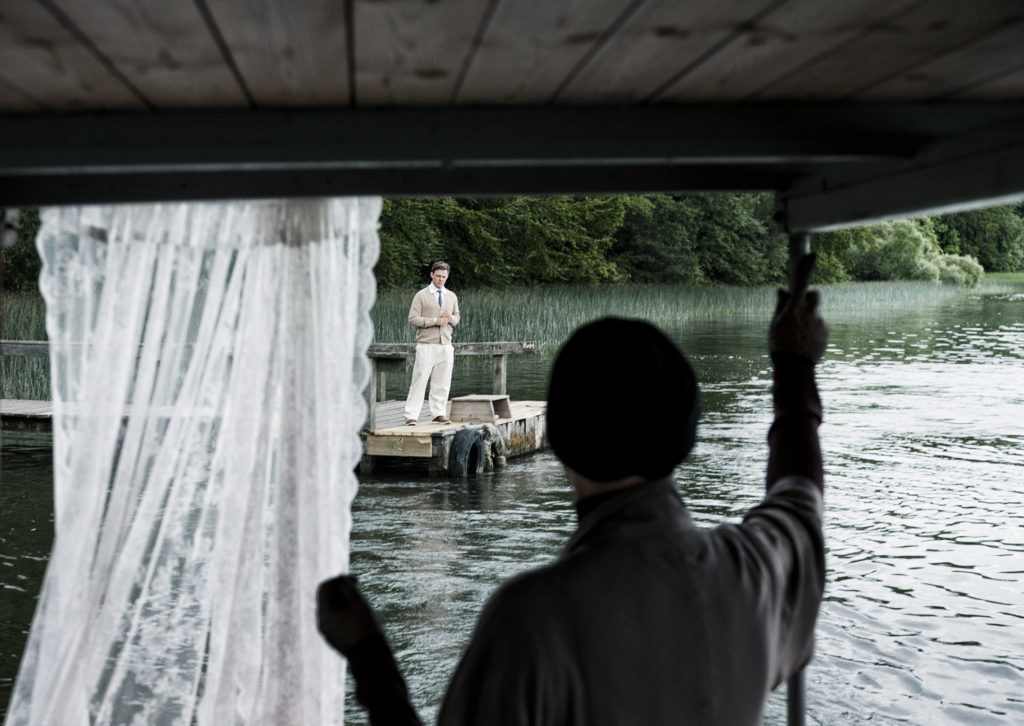
Photo: Per Morten Abrahamsen
We have the most absolutely amazing encounters with our audience when out on the boat and when touring. Encounters which seem primarily to have come about because of this different way of producing theatre.
We come together with our audience in a different way. Together we have moved out of the dark into the reality of the outdoors and, by this, have invited a different relationship with individual audience members.
Perhaps, unknowingly, this was really what we dreamt of when founding Det Flydende Teater. For sure, it is such encounters that constantly keep our curiosity and dream of the city theatre alive.
About Det Flydende Teater
Det Flydende Teater has, since its founding, in 2005, created contemporary Danish drama that focuses on some of the most prominent people in Danish culture. These include, amongst others, J.P. Jacobsen, Karen Blixen, Henrik Nordbrandt, Asger Jorn and Naja Marie Aidt.
The productions are portrayals as retold through the artist’s own works. Det Flydende Teater’s productions are initially performed on the company Baadfartens boats on Fure Lake, whereafter the production will tour.
The text, lyrics, artworks, and music all come together, mirroring and complementing each other. The playwriting and the accompanying music is specifically commissioned for Det Flydende Teater’s productions.
Today Det Flydende Teater is managed by company manager Christine Worre Kann and artistic director Pelle Nordhøj Kann.
For more information, please visit www.detflydendeteater.dk
Edited and translated by Pernille Thisted
This post was written by the author in their personal capacity.The opinions expressed in this article are the author’s own and do not reflect the view of The Theatre Times, their staff or collaborators.
This post was written by Pelle Nordhøj Kann.
The views expressed here belong to the author and do not necessarily reflect our views and opinions.

